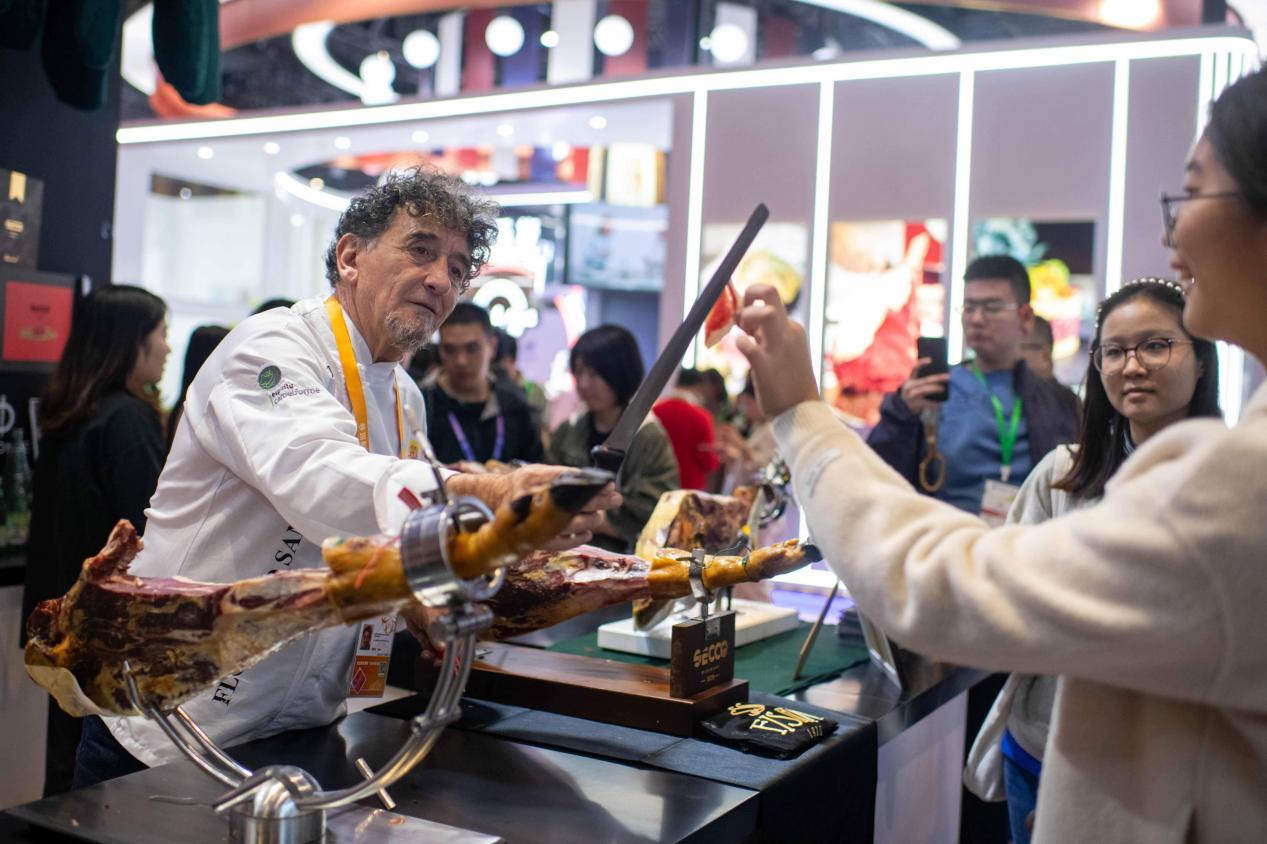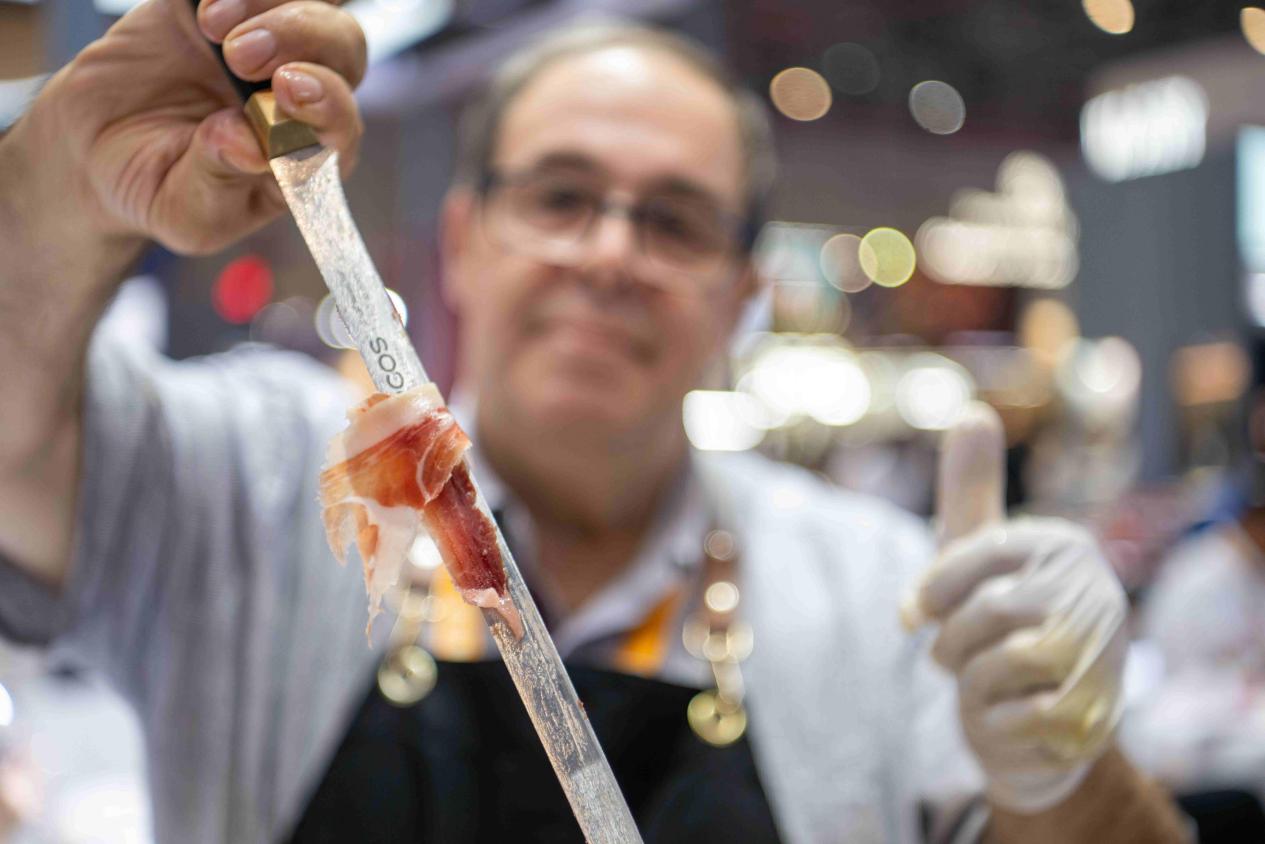




- BRNN
- BRI News
- BRNN News
- Database
Official Documents Polices and Regulations
Inter-government Documents International Cooperation BRI Countries
Business Guide Economic Data BRI Data
Trade
Investment Projects Latest projects
Cases - Content Pool

Visitors taste Spanish ham at the 7th China International Import Expo, Nov. 9, 2024. (People's Daily Online/Weng Qiyu)
Since its debut at the inaugural China International Import Expo (CIIE) in 2018, Spain's Iberian ham has been a staple attraction at the annual event. Its complex aroma and savory depth have consistently drawn crowds, establishing it as one of the Expo's star products. Thanks to the CIIE platform, Iberian ham has progressively entered the culinary landscape of Chinese consumers.
The town of Guijuelo, Spain, produces approximately 60 percent of the country's renowned Iberian ham globally by gourmets for its distinctive marbling and nuanced flavor.
Each autumn, Guijuelo's oak forests yield abundant acorns that nourish free-ranging black Iberian pigs. The region's elevated terrain, characterized by cold, dry winters and brief mild summers, creates optimal conditions for traditional air-curing of hams.
At century-old producer Julian Del Aguilar (established 1895), artisans commence work at dawn. Within curing rooms, thousands of hams suspended from wooden rafters permeate the air with their characteristic savory fragrance.
Master craftsman Ramos, with 41 years of experience at the company, explains: "From initial salting through natural curing, each ham requires at least three years of maturation here. This century-old tradition remains our point of pride." Ramos meticulously inspects each ham before selecting matured specimens for quality grading and packaging.
The transformative impact of CIIE became evident when Spanish producer-distributor La Encina participated in the 2018 inaugural edition with modest expectations. Their initial six-month supply of 500 kilograms sold out within days, catalyzing broader Spanish industry interest in the Chinese market. This year, Jose Maria Aguilar, the fifth-generation heir of Julian Del Aguilar, brought his family's heritage and products to the eighth CIIE.

A staff member of an exhibitor shows Iberian ham at the 6th China International Import Expo, Nov. 7, 2023. (People's Daily Online/Weng Qiyu)
"The CIIE has fundamentally reshaped our strategic outlook," said Jose Maria Aguilar. "China's vast middle-income population represents unparalleled potential for both investment and consumption. The Expo and the Chinese market collectively provide the confidence and platform to transition our family enterprise into a globally recognized brand."
According to Guijuelo's mayor, Roberto Martin, the town has a permanent population of 6,000 and more than 120 ham producers, earning it the nickname "City of Ham." The industry provides jobs for over 90 percent of local residents and creates significant employment opportunities in surrounding areas.
In November 2018, shortly after the first CIIE, China and Spain signed an agreement allowing bone-in Spanish ham to be exported to China, opening up a major opportunity for Iberian ham producers. La Encina has since set up a branch in Shanghai and opened an online store on Chinese e-commerce platforms. Julian Del Aguilar has also invested in its first Iberian ham processing plant in Qingdao, east China's Shandong province.
Data from the Spanish Institute for Foreign Trade and the Interprofessional Iberian Pork Association show that in 2024, Spain's exports of ham and cured shoulder products to China exceeded 28 million euros ($32.23 million), up about 60 percent from five years ago. The growth has continued into this year, with exports rising 8.4 percent year-on-year in the first half of 2025.
"The openness of the Chinese market has been crucial for Iberian ham's journey onto the global stage," said Martin. "We hope that through platforms like the CIIE, Iberian ham will gain even more opportunities in China, which not only drives the growth of Guijuelo's entire industrial chain and boosts the local economy, but also encourages the younger generation to stay, continue this craft, and build their own future here."
Since the first CIIE, premium Spanish agricultural products such as ham, wine, and olive oil have become popular highlights at the expo, making China one of the fastest-growing markets for Spanish agri-food exports.
Angel Prieto, vice president for External Affairs at Spain's National Association of European Business and Innovation, said the CIIE provides a valuable opportunity for Spanish companies to enter China and showcase innovative products.

Visitors taste Spain's Iberian ham at the 8th China International Import Expo, Nov. 5, 2025. (People's Daily/Jiang Bo)
"Chinese consumers are increasingly pursuing high-quality products and cultural value," said Martin. "Guijuelo's ham producers are also working hard in that direction."
Maria Naranjo, spokesperson and director of the food industry at the Spanish Institute for Foreign Trade, noted, "The Spanish government places great importance on exports and is closely watching China's dynamic market. Meat ranks as the second-largest category in Spain's agricultural exports, and China now accounts for over 30 percent of Spain's pork exports."
Naranjo said the CIIE has become an important platform for strengthening trade ties between Spain and China, and the strong participation of Spanish companies reflects their desire to deepen cooperation with Chinese partners.
"The making of Iberian ham is a testament to tradition," said Martin. "The Chinese market and the CIIE platform have given this tradition a broader and brighter future."

Tel:86-10-65363107, 86-10-65368220, 86-10-65363106